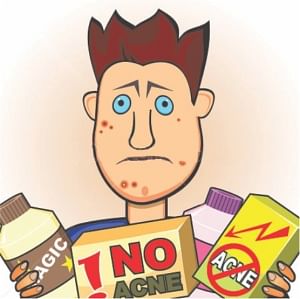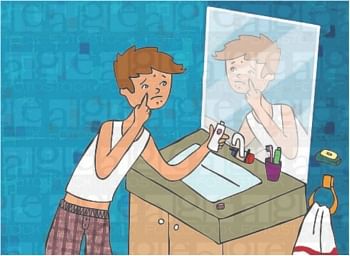| Home - Back Issues - The Team - Contact Us |
 |
| Volume 11 |Issue 28| July 13, 2012 | |
|
|
Health
X Marks the Spot Soraya Auer
Nothing is more embarrassing than a person in front of you frowning and saying “I think you've got something on your face,” only to realise the 'thing' they reach out to brush off is actually a part of your face. “I never quite know how to react when they realise it's acne,” says 23-year-old student Tuhin, who says he's suffered from the skin condition for 10 years. “There's an awkward 'oh' moment before they change the subject.” He pauses before adding, “That or an aunty will tell me I have bad skin in front of people – as if I didn't know already.”
Acne, which is the medical term for spots, pimples, zits, and blackheads, is a skin problem that starts when oil and dead skin cells clog up your pores. Considering how many people suffer from the condition in their lifetime, it is surprising that it is one of the most poorly understood skin problems. For example, many people believe acne only takes place on the face, but breakouts can occur on someone's arms, chest and back. There is also the preconception that it only affects teenagers. Over 80% of cases of adult acne occur in women according the British National Health Service. It is thought that many cases are caused by changes in hormone levels that many women have at certain times. These include just before a woman's period, during the first three months of pregnancy and due to polycystic ovary syndrome, which is a poorly understood but common condition. Thirty-three year old Rohima believes her acne began at the age of 25, when she wore heavy make-up for her wedding. “I had soft clear skin and rarely used any foundation or concealer, but it's just not been the same since my wedding,” says the young mother of two. If you've lived with acne or with the fear of getting acne, you've probably been exposed to many myths about the skin condition. “Don't eat greasy food,” “Wash your face lots,” “Squeezing the zit is the best way to get rid of it,” and so on. Are any of these true? the Star looked at some of the common mistakes people are making around the world when treating this universal irritation. “Acne is caused by a poor diet” “Acne is caused by having dirty skin and poor hygiene.” “Popping blackheads, whiteheads and zits is the best way to get rid of acne.” Giving up on a treatment before it's started An interesting fact to note is that acne may need to get worse before it will get better, so patience is crucial.
Trying too many products at once Over-scrubbing or over-cleansing the skin Waiting too long before seeing a dermatologist There can be a temptation to self-prescribe acne medication in Bangladesh as there are no restrictions are pharmacies. However, you risk overusing or under-using a prescribed acne medication so it is wise to see a medical professional before attempting to use prescribed meds. Stopping the use of acne medication once it clears up To keep skin blemish-free, most people need to continue using at least one acne product, regularly or a few times a week. The real challenge for all acne sufferers is patience. Without it, you'll give in to one of the mistakes above and remain in a cycle of frustration and pimples so good luck and be patient.
|
||||
Copyright
(R) thedailystar.net 2012 |


